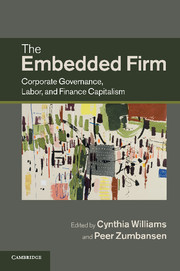Book contents
- Frontmatter
- Contents
- Figures
- Tables
- Contributors
- 1 Introduction: corporate governance after the ‘end of history’
- Part I Historical trajectories of business and regulation
- Part II New interests, new shareholder constellations, new landscapes
- Part III Labor’s evolution in the new economy
- 13 Labor and finance in the United States
- 14 The conflicting logic of markets and the management of production
- 15 Organizing workers globally
- 16 From governance to political economy
- Part IV The transnational embedded firm and the financial crisis
- Part V Conclusion
- Index
- References
14 - The conflicting logic of markets and the management of production
from Part III - Labor’s evolution in the new economy
Published online by Cambridge University Press: 07 September 2011
- Frontmatter
- Contents
- Figures
- Tables
- Contributors
- 1 Introduction: corporate governance after the ‘end of history’
- Part I Historical trajectories of business and regulation
- Part II New interests, new shareholder constellations, new landscapes
- Part III Labor’s evolution in the new economy
- 13 Labor and finance in the United States
- 14 The conflicting logic of markets and the management of production
- 15 Organizing workers globally
- 16 From governance to political economy
- Part IV The transnational embedded firm and the financial crisis
- Part V Conclusion
- Index
- References
Summary
Introduction
Since the late 1990s, as the typical American family saw its income stagnate, the availability of easy credit and cheap imports fueled a consumer and real estate market boom. Households were able to use debt to supplement earnings and thereby live beyond their means, under the illusion of prosperity. The housing bubble and low interest rates added to the illusion as households were encouraged to increase borrowing, using the rising equity in their homes as collateral to fund additional consumption and investment in housing.
The conditions that produced this consumer boom were less comfortable for investors and financial intermediaries. Low interest rates and the large volume of Asian savings in the market not only depressed returns on traditional financial instruments. It also generated increasing pressure from investors for higher yields which could be achieved in essentially two ways: higher risk and higher leverage. Many opted for both, using the booming property markets as fuel. In 2007, however, the US sub-prime bubble burst, plunging the global money markets and economy into crisis and revealing serious imbalances in the system as a whole.
- Type
- Chapter
- Information
- The Embedded FirmCorporate Governance, Labor, and Finance Capitalism, pp. 318 - 332Publisher: Cambridge University PressPrint publication year: 2011



